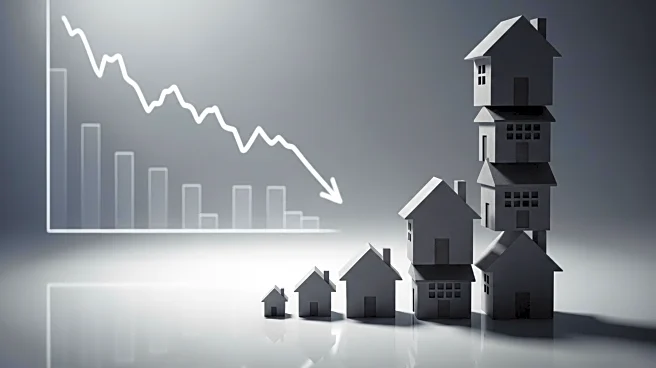What is the story about?
What's Happening?
Nationwide Building Society has reported an unexpected decline in UK house prices for August, marking a 0.1% drop from July. This represents the third consecutive month of decline since April, when a tax break for lower-value home buyers expired. Despite the monthly decrease, house prices were still 2.1% higher than the previous year, although this is the weakest growth rate since June of the previous year. Economists had anticipated a 0.2% monthly increase and a 2.8% annual rise. The subdued growth is attributed to stretched affordability, with average earners facing mortgage payments that consume about 35% of their take-home pay, compared to the long-term average of 30%. The Bank of England recently reduced its benchmark interest rate to 4% but expressed concerns about inflation, which may slow further rate cuts.
Why It's Important?
The decline in house prices is significant as it reflects broader economic challenges, including affordability issues and potential tax changes. The housing market is a critical component of the UK economy, influencing consumer spending and financial stability. The current situation may deter potential buyers, impacting market dynamics and possibly leading to a slowdown in housing transactions. Additionally, the Bank of England's cautious approach to interest rate cuts, due to inflation concerns, suggests that borrowing costs may not decrease significantly in the near future, further affecting buyer sentiment and market recovery.
What's Next?
Looking ahead, the housing market may face further challenges if speculation about potential property tax increases, such as a mansion tax, materializes in the upcoming autumn Budget. This could further dampen buyer confidence and slow market recovery. Stakeholders, including policymakers and real estate professionals, will need to monitor these developments closely to assess their impact on the housing market and broader economic conditions.
Beyond the Headlines
The current housing market trends may have long-term implications for economic inequality, as affordability issues could widen the gap between those who can and cannot enter the housing market. Additionally, the potential for increased property taxes could shift investment strategies and influence urban development patterns.















